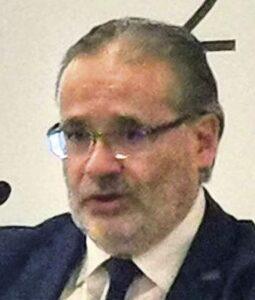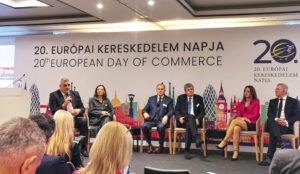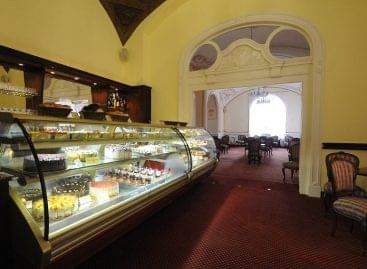Europe’s Day in Commerce: the sector is changing
Europe’s Day in Commerce has been organised for the 20th time, with the National Association of Entrepreneurs and Employers (VOSZ) once again highlighting the strategic importance of the domestic retail trade sector. At the event the Klauzál Gábor Certificates of Honour and the Grand Prize for Hungarian Retail were also presented to the winners.

This article is available for reading in Trade magazin 2024/12-2025/01
This year was special because a board meeting of EuroCommerce was also held in Budapest.

László Perlusz
secretary general
VOSZ

Christel Delberghe
director general
EuroCommerce
In her welcome speech Christel Delberghe, director general of EuroCommerce underlined the economic importance of the retail sector in Europe, which provides 26 million jobs and contributes 10% of GDP.
László Perlusz, secretary general of VOSZ also welcomed participants and talked about the economic, social and cultural importance of retail.
He mentioned the Skills for Retail project, which aims to develop the competences of professionals, with digital and sustainable development in mind.
550,000 Hungarians make a living off retail trade

László Krisán
president of trade section
VOSZ
László Krisán, the president VOSZ’s trade section underlined that Hungarian retail trade generates an annual turnover of HUF 18,300bn if we exclude the vehicle trade. The sector provides a livelihood for more than 550,000 people, which is 12% of the 4.7-million Hungarian workforce and its contribution to the GDP is 11.5%.
He highlighted the importance of government support, especially in the field of digitalisation.
Minister for National Economy Márton Nagy told: the ministry forecasts that inflation could fall back to around 3% in 2025, after a temporary rise due to base effects.

Márton Nagy
minister for national economy
“Inflation can be kept low for a longer period, while we also pay attention the growth of the economy”, he added. The 4.1% growth in retail sales in August indicates that consumption is already having a positive impact on the GDP, which is forecast to expand by 1.5% in 2025. Food consumption showed an even bigger growth at 7%.
3-6% economic growth?
Hungary’s economy is expected to grow by 3-6% in 2025, but whether this can be achieved depends largely on the international environment, in particular the performance of the German economy and potential trade conflicts. Márton Nagy pointed out that the Hungarian retail sector is currently dominated by foreigners, as the six largest retailers in terms of sales revenue are all foreign-owned. The goal is to have domestic companies in the top five, especially in FMCG retail. Almost 15% of domestic retail sales is now taking place online, but only three of the 15 biggest online retailers are Hungarian-owned. This creates consumer protection and commercial challenges. From August 2024 the ministry took over the supervision of consumer protection. The establishment of a new authority, the National Authority for Retail Trade and Consumer Protection (NKFH) has also been announced, which will be operational from 2025 and will have four main functions: giving technical support to trade policy, managing the consumer protection authority, supervising food safety in retail trade, and performing retail trade and consumer protection related laboratory tests.
Roundtable on trade challenges
Attila Prosits, member of the board of the Hungarian Council of Shopping Centres and managing director of Granite Invest was the moderator of the roundtable discussion. László Krisán said regulations need to be simplified, because at the moment they are a big burden on small businesses and micro-enterprises. In his view maintaining competitiveness and simplifying rules are central to the development of the retail sector. Christel Delberghe stressed that the retail sector is making great effort to promote sustainability, the circular economy and climate protection, but regulations make life difficult for SMEs. She underlined the importance of coherent and transparent legislation, in which EuroCommerce supports companies.

Katalin Neubauer, secretary general of the Hungarian National Trade Association (MNKSZ) pointed out that the rapidly changing regulatory environment particularly affects SMEs and micro-enterprises, as they find it difficult to keep up with new regulations: compliance often distracts attention from core business activities. Zoltán Zs. Szőke, president of the ÁFEOSZ-COOP Association explained that the regulatory requirements of the European Union, such as increasing the minimum wage, are putting considerable pressure on the Hungarian economy and their implementation poses serious challenges. Retail operators are often confronted with rapidly changing legislation, sometimes having to implement regulations overnight. Dr Tamás Kozák, secretary general of the National Trade Association (OKSZ) told: although trade accounts for 10% of the EU’s GDP, in Hungary this proportion is declining and the added value remains below the EU average. Hungarian online retail sales are around HUF 1,500bn, which is 7% of the total retail trade value, compared to the 14% in the Czech Republic. //
Related news
NGM: the government is extending the 5+1-point catering industry action plan to include pastry shops
🎧 Hallgasd a cikket: Lejátszás Szünet Folytatás Leállítás Nyelv: Auto…
Read more >Related news
Ham seasons: the bad, the better and the good (?)
🎧 Hallgasd a cikket: Lejátszás Szünet Folytatás Leállítás Nyelv: Auto…
Read more >PwC Global CEO Survey: CEO confidence at a five-year low
🎧 Hallgasd a cikket: Lejátszás Szünet Folytatás Leállítás Nyelv: Auto…
Read more >







